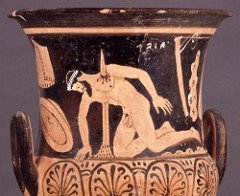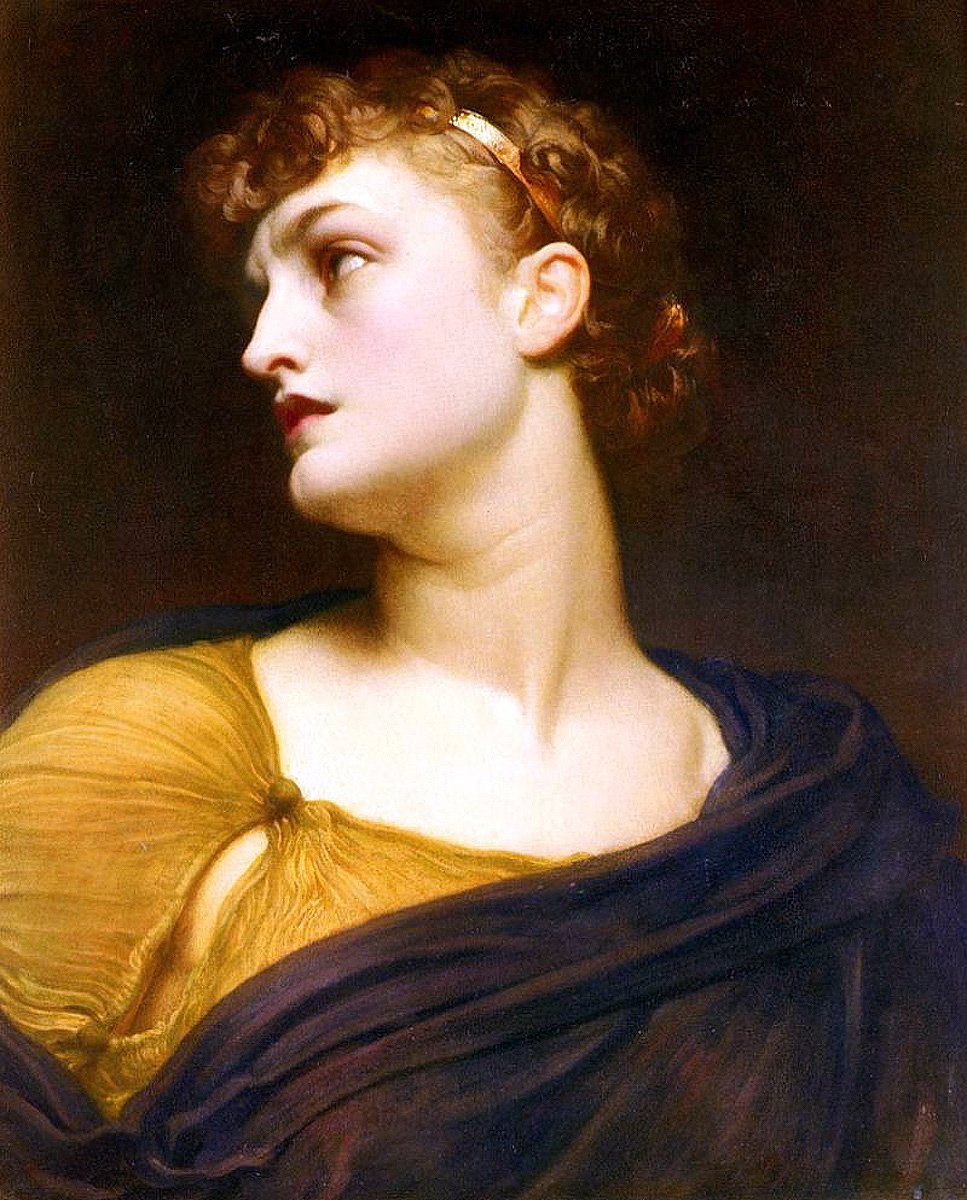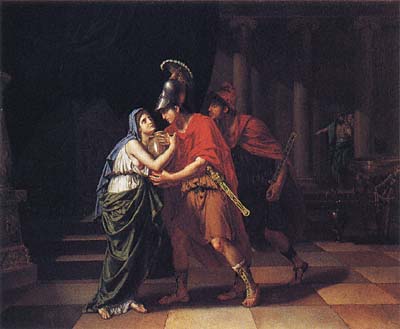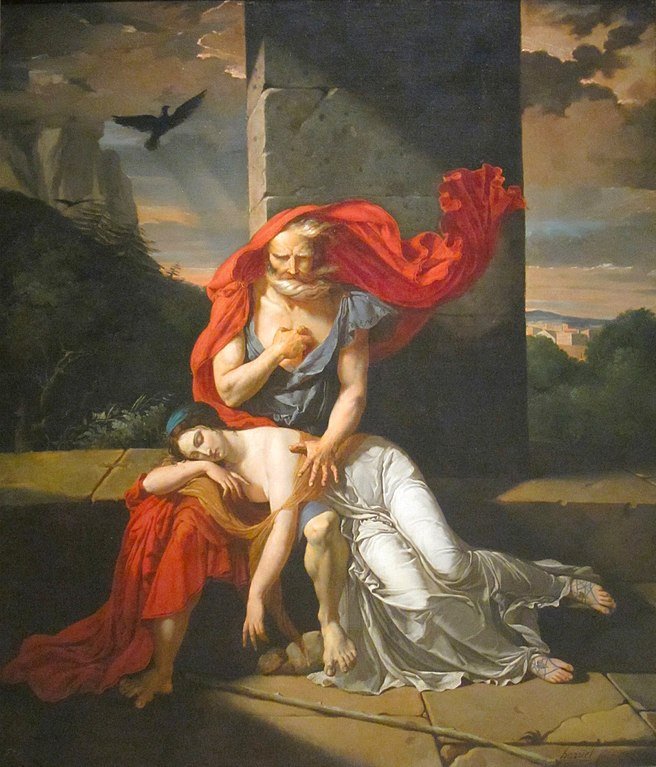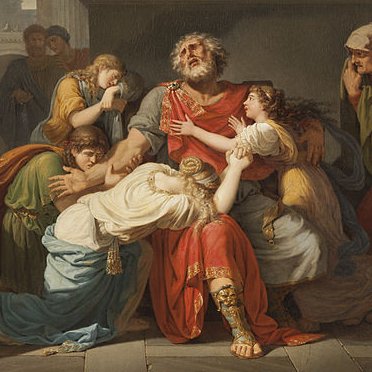Sophocles
Though Aeschylus was considered “the father of tragedy” by almost everybody in the ancient world, Sophocles was generally more loved, and his plays were often considered a better specimen of the genre. Born into a wealthy family at Colonus just a few years before the battle of Marathon (most probably 496 BC), Sophocles debuted at the City Dionysia in 468 BC and, according to Plutarch, immediately turned the attention to himself, triumphing over Aeschylus, for years the sovereign ruler of the Ancient Greek stage. After the death of his predecessor (456/5 BC), Sophocles became the preeminent playwright in Athens, a title he held onto for the next half a century, practically until his very death at the age of 90 in the winter of 406/5 BC. During this period, Sophocles is said to have authored over 120 plays, only seven of which survive to this day in their entirety: Antigone, Ajax, Women of Trachis, Oedipus Rex, Electra, Philoctetes and Oedipus at Colonus. Ancient sources claim that Sophocles competed 30 times at the tragic festivals and that 24 times he won the first prize; he was placed second the other six. Even while still alive, Sophocles came to be regarded as one of the wisest men in all of Greece, and soon after his death authors such as Aristophanes and Phrynichus paid warm tributes to him, paving the way for the subsequent canonization of both his name and his oeuvre.
Sophocles’ Life and Works
Life
Though the Suda says that Sophocles was born during the 73rd Olympiad (488/5 BC), he was most probably born a decade earlier, in (or about) 496 BC in the village of Colonus, just a little north of Athens. His father, Sophillus, was a highly educated and wealthy armor manufacturer and slaveowner. Raised in prosperity, Sophocles received an aristocratic education and excelled in both wrestling and music. Because of his talent, when he was merely sixteen years old, he was chosen to lead the chorus with his lyre and sing a triumphant paean in honor of the victory at Salamis in 480 BC.
He debuted at the City Dionysia in 468 and immediately achieved his first victory over none other than his spiritual teacher in the art of tragedy, Aeschylus. After his death, Sophocles emerged as the preeminent Athenian playwright and dominated the tragic stage for the next fifty years. During this period, he won at least 18 first prizes at the City Dionysia, and perhaps an additional 6 at the Lenaea, a lesser tragic festival. His ancient biographers claim that he competed about 30 times overall and that he never finished lower than second place.
Well respected by the people, Sophocles also enjoyed excellent relations with Pericles, under whose leadership he served as both an imperial treasurer of the Athenian Alliance (443/2) and as one of the ten Athenian generals during the campaign against Samos (441/0). He might not have excelled at these positions, but his wisdom was so highly regarded that, after the Sicilian disaster of 413, he was elected for another public office, as one of the ten commissioners (probouloi) responsible for finding a way out of the problematic situation Athens was in. As such, he might have contributed to the Athenian coup of 411 BC which replaced the democratic government of ancient Athens with the so-called rule of the Four Hundred, a group of oligarchs who remained in power for the next year or so.
Somehow, Sophocles’ name remained untarnished even after this, and at the very first City Dionysia after the Athenian democracy was restored (409 BC), he emerged as victorious once again. He died in Athens three years later, soon after finishing his last, testimonial play, Oedipus at Colonus (produced posthumously by his grandson Sophocles, son of Ariston, in 401 BC). “Fortunate was Sophocles,” wrote Phrynichus in the play The Muses, performed a month or two after the great playwright’s death. “After a long life he died, a happy and accomplished man. After writing many fine tragedies he came to a happy end, enduring nothing that was evil.”
Plays
Ancient scholars knew of 130 plays attributed to Sophocles, but even they doubted the authenticity of either seven (the Suda) or seventeen of them (the Life). Only seven of these have survived to this day in their entirety: Antigone, Ajax, Women of Trachis, Oedipus Rex, Electra, Philoctetes and Oedipus at Colonus.
In addition, there are substantial papyrus fragments of two other tragedies by Sophocles (Eurypylus and Niobe) and two of his satyr-plays (Trackers and Inachus). In fact, only Euripides’ Cyclops (the only extant example of the genre) is better preserved than Sophocles’ Trackers.
As for the number of Sophocles’ victories at the tragic festivals of Ancient Athens, a few figures get tossed around in antiquity. The official tally for wins at the most important festival, the City Dionysia, can be deduced, with some certainty, to be 18, five more than Aeschylus’ total. Since some sources claim that Sophocles won at least two or six other times, modern scholars think that these victories might have come at some of the lesser festivals, such as the Lenaea.
Legacy
“In his character there was so much charm,” writes the ancient biographer of Sophocles, “that he was loved everywhere and by everyone.” Indeed, though Aeschylus is deemed the originator of tragedy and Euripides is the one about whose life and works most material has survived to this day, Sophocles was “the best-loved of the tragedians,” adored to the point of beatification. In fact, the Alexandrian Life of Sophocles claims that, on account of his virtue, the Athenians voted that sacrifices should be made to the playwright every year. Possibly connected but far stranger, a medieval Byzantine lexicon claims that, after Sophocles’ death, the Athenians renamed their favorite playwright and worshipped him under the name of Dexion (the Receiver). They decided on that name on account of Sophocles supposedly giving the god Asclepius hospitality when he was initially introduced to Athens in 420/19.
Be that as it may, Sophocles was highly respected as an author, with Aristotle often drawing attention to his plays (and Oedipus Rex especially) as perfect examples of one dramatic strategy or another. According to the great philosopher (and a few other ancient sources), it was Sophocles who introduced the third actor and painted scenery in theatrical productions. The Suda also claims that he was the first author to increase the chorus from twelve to fifteen members, and the first one to abandon the tetralogy form.
Owing to his noble style and the poised and collected manner in which he paints his characters, Sophocles was widely considered the most balanced of the three great tragedians. This is what Dio Chrysostom highlights in his “52nd Discourse” in which he compares Sophocles’ Philoctetes with two plays (now lost) on the same subject by Aeschylus and Euripidies. “As for Sophocles,” he writes, “he seems to stand midway between the two others, since he has neither the ruggedness and simplicity of Aeschylus nor the precision and shrewdness and urbanity of Euripides, yet he produces a poetry that is august and majestic, highly tragic and euphonious in its phrasing, so that there is the fullest pleasure coupled with sublimity and stateliness.”
Dubbed “the Bee” because of the sweetness of his words (the Suda) and his “honey-smeared mouth” (Aristophanes), Sophocles was the only one worthy enough to be considered a disciple of Homer. His epitaph supposedly read: “I enclose in this tomb Sophocles, who took first place in the tragic art, a most venerable figure.”
Chronology of Sophocles’ Life
• 496 – birth at Colonus, near Athens, the setting of his final play
• 480 – led the chorus with a lyre during the celebration of the victory at Salamis
• 468 – most probably Sophocles’ debut at the City Dionysia, and almost certainly his first victory (over Aeschylus)
• 463 – Aeschylus’ revenge: he won with his Danaid trilogy (of which The Suppliants was part of); Sophocles finished second
• 445-0 – the most probable period for the first productions of Antigone and Ajax
• 443/2 – served as imperial treasurer of Athens
• 4421/0 – served as elected general of Athens
• 438 – victory with an unknown trilogy (defeated Euripides)
• 435-430 – the most probable period for the first production of The Women of Trachis
• 431 – second prize with an unknown trilogy (lost to Aeschylus’ son Euphorion; Euripides placed behind him)
• 429 – the most probable year for the first performance of Oedipus Rex
• 418 – the most probable year for the first performance of Electra
• 413–11 – served as proboulos, one of the magistrates of Athens after the defeat at Sicily during the Peloponnesian War
• 409 – victory with a trilogy which included Philoctetes
• 406-5 – died at Athens
• 401 – posthumous production of Oedipus at Colonus
Sophocles Sources
You can read the Alexandrian Life of Sophocles here, beautifully translated and excellently annotated by Sarah Burges Wilson. There are two reliable translations of the entry for the great author in the medieval encyclopedia, the Suda, available online: here and here. For a more modern biography with links to relevant sources, consult Gregory Crane’s article in the Perseus Encyclopedia. For the more curious and inquisitive ones, be sure the check out Sarah Burges Wilson’s “Sophocles: A Guide to Selected Sources,” which links to original versions and translations of almost all essential ancient sources for Sophocles’ life and works. Finally, here you can find a translation of Dio Chrysostom’s “52nd Discourse.”
Link/cite Sophocles page
Written by: The Editors of GreekMythology.com. GreekMythology.com editors write, review and revise subject areas in which they have extensive knowledge based on their working experience or advanced studies.
For MLA style citation use: GreekMythology.com, The Editors of Website. "Sophocles". GreekMythology.com Website, 30 Sep. 2021, https://www.greekmythology.com/Plays/Sophocles/sophocles.html. Accessed 27 April 2024.

